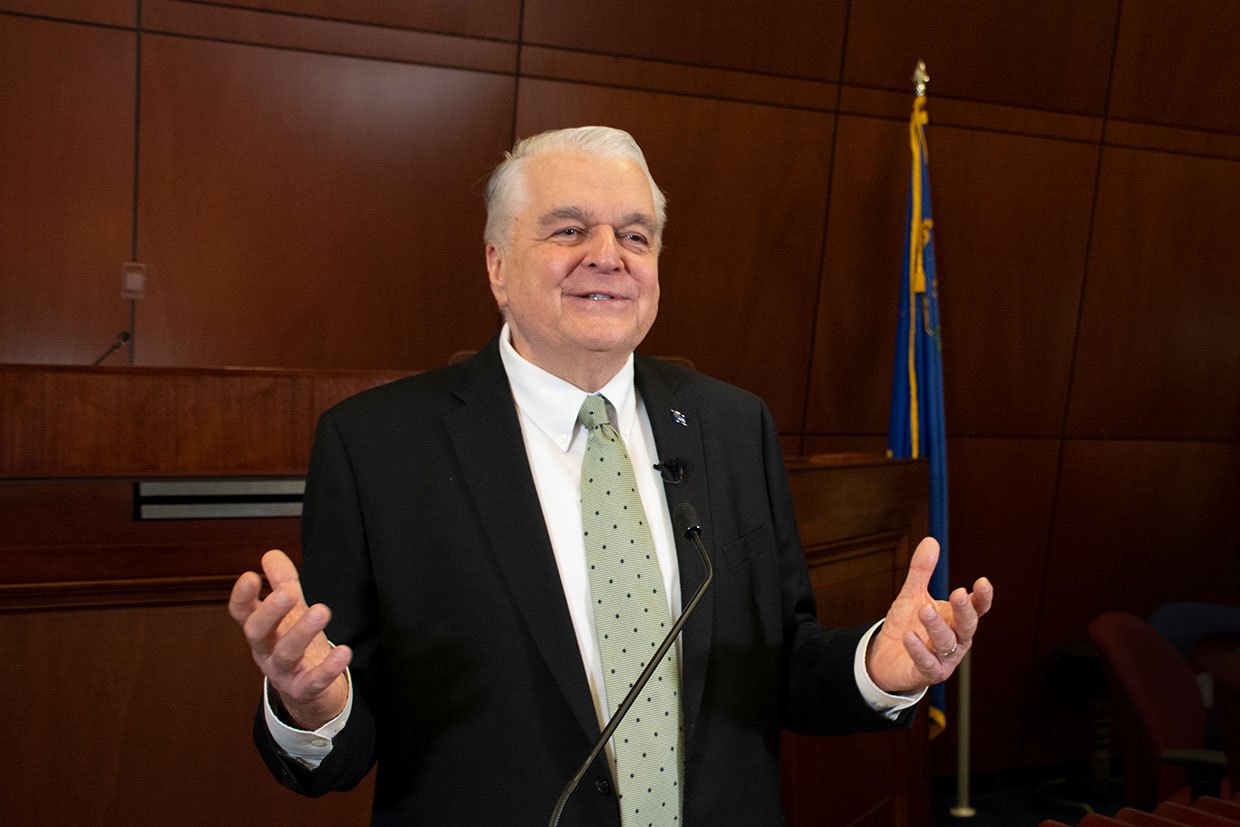A shocking new piece of proposed legislation from Nevada’s governor would empower major tech companies to establish and run their own local governments.
Delivering his state of the state address on Jan. 19, Democrat Gov. Steve Sisolak announced an eerily Orwellian plan to establish “Innovation Zones” in Nevada to boost the state’s economy by appealing to major players in the tech industry.
Sisolak stated, “Following the passage of my Innovation Zone legislation, Blockchains, LLC, has committed to making an unprecedented investment in our state to create a smart city in northern Nevada that would fully run on blockchain technology—making Nevada the epicenter of this emerging industry and creating the high paying jobs and revenue that go with it.”
Despite Sisolak’s measured tone and promising words, the plan to transform Nevada into an epicenter of innovative technology is reminiscent of an elaborate scheme some Bond-esque villain might conjure up. At the very least, there are some easily overlooked conflicts of interest beyond mere ramifications from the bill’s implementation.
A draft of Sisolak’s proposed legislation was exclusively obtained by the Las Vegas Review-Journal and has not yet been formally introduced in the legislature.
According to the Las Vegas Review-Journal, “The draft language of the proposal says that the traditional government model is ‘inadequate alone to provide the flexibility and resources conducive to making the State a leader in attracting and retaining new forms and types of businesses and fostering economic development in emerging technologies and innovative industries.”
Additionally, the article states, “this ‘alternative form of local government’ is needed to aid economic development within the state.”
Many on both sides of the proverbial political aisle would likely agree that government, whether on the local, state or federal level is hindered by red-tape bureaucracy, but imaginably fewer could effectively argue the need for transitioning to a corporate-controlled alternative.
Requirements for the “innovative zones” were laid out in the bill’s draft. Applicants must own 50,000 acres, or 78-square miles of undeveloped, uninhabited land, all of which must be within a single county but separate from any tax increment area or city. Another eye-catching requirement is for applicants to possess $250 million as well as a presented plan to invest an additional $1 billion over the next ten years into the zone. Those operating an “innovative zone” would later be required to report capital investments, infrastructural progress and estimated number of employees to the state legislature at the biennial session.
Controlling these zones, which the Governor’s Office of Economic Development said would be limited to “innovative technology,” was also covered in the obtained draft. While initially operating within the guidelines and needs of their counties, AP News reported the zones would, “eventually take over the county duties and become more independent governmental bodies.”
During last month’s speech, Sisolak said Blockchain, LLC was committed to developing a “smart city” east of Reno, Nevada, which would run entirely off of the company’s own developed technology. More importantly, the governor failed to mention his own pre-existing and generous-natured relationship with Blockchain, LLC.
Lawyer and crypto-currency millionaire Jeffery Berns owns Blockchain, LLC and is remarkably active in financing elements of Nevada’s state politics. According to the Las Vegas Review-Journal, Berns purchased a nearly 67,000-acre plot of undeveloped and uninhabited land for $170 million. Following the millionaire’s land acquisition in 2018, Berns showed major financial support for Democrat politicians in the state, including contributions to Sisolak.
Campaign finance records indicate that the Home Means Nevada PAC that oversaw Sisolak’s transition into office received a $50,000 donation from Blockchains, LLC, in January 2019. That same year, Berns donated $50,000 to Nevada’s Democratic Party. The same records also show the company donating $10,000 to Sisolak’s campaign in the heat of 2018’s gubernatorial election cycle. Oddly, Sisolak’s Republican opponent also received a donation of the same amount from the company at a similar time.
According to AP News, “The proposed zones would permit companies with large areas of land to form governments carrying the same authority as counties, including the ability to impose taxes, form school districts and courts and provide government services.”
Fortunately, the bill has not passed and some of Nevada’s state officials have voiced their concerns about the policy in addition to personal doubts about its implementation. Storey County Commissioner, Lance Gilman, said that Blockchain’s Innovative Zone will undoubtedly impact the county, “and the jury is still out on whether that will be positive or negative.”
Echoing Gilman’s uncertainty and channeling concern, Republican Senate Minority Leader, James Settelmayer, said, “The legislation seems to be rather one-sided, that the Innovation Zones get to make determinations and the county has to go along with them.”
The significance of this murky merging of corporate power with demonstrably proven financial support for one political party and the governor pushing this policy into motion, with the state’s power of governance, cannot be overstated.














Be First to Comment